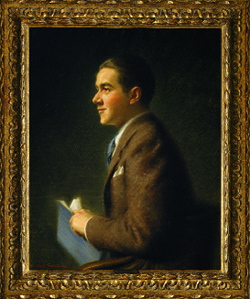The portrait below of Edward Sheldon '08, A.M. '08, shows the first promising American playwright of the last century as he must have looked when he was in his late twenties: the author of a string of Broadway successes, a restless world traveler and dashing social figure, the author of at least one play--Romance--whose London run of 1,049 performances easily represented another era's equivalent of today's Andrew Lloyd Webber marathons. When he died, some 30 years later, this playwright, once the image of precocious brilliance, had been too hideously crippled for too many years to hold a manuscript in his hands, as he does so raptly in the picture. He could not even turn his head, and it had been years since he could see a stage--or anything else.
 |
| A posthumous portrait of Sheldon by Paul Trebilcock. |
| Photograph courtesy of the Harvard Theatre Collection, Houghton Library, Harvard College Library |
But it was in those years of blind paralysis that Edward Sheldon contributed most vitally to the art form he cherished. In Vatican-like splendor, he dispensed serene strength, as well as uncanny advice, to colleagues stunned by his patient endurance. Lillian Gish first referred to him as "the pope of the theater," and for a generation of theater artists whose work he could not see, his word had holy authority.
Born into a Chicago family of railroad millionaires and real-estate barons, Sheldon was exquisitely sensitive and theater-mad from a young age. A prize student of Professor George Pierce Baker, founder of the playwriting class "47 Workshop," Sheldon seems to have surprised no one when, within five years of graduation, he was the author of four Broadway plays, most of them hits. Contemporary critics, eager to witness the birth of America's first great playwright, gladly mistook his class-conscious suspense stories for the native equivalents of Ibsen and Zola.
In truth, they were much too naive and sentimental for that. But plays such as Salvation Nell and The Boss, with their credible plot turns, raw urban bounce, and surprisingly equal feel for the details of slum life and high society are still the testaments of an artist who had a decent grip on character and a sincere sense of social justice. His melodramas all but forecast the virtues of Hollywood in its heyday, and in the Thirties, the 1913 megahit Romance actually became an MGM film starring Greta Garbo.
The portrait testifies to the brio and zest of the prewar playwright who became known as Broadway's Wonder Boy. When Sheldon was at his height, his personal income, both private and earned, was enormous. His place in the theatrical and social circles of New York was at the top.
Then, slowly, his future was revoked. When he was 29, a monstrously crippling disease, most likely ankylosing spondylitis, began its progressive assault, and within a few years, Sheldon was so hopelessly prone that he could be installed in a Pullman coach only on a stretcher, through windows whose glass had been removed. And yet, in strange ways, the man within the broken body did not change. Until the disease stole his sight in 1930, he continued writing plays, mostly in collaboration with a series of novices. One result, a suave and fast-moving adaptation of The Age of Innocence, could probably bear revival now.
In his forties, only Sheldon's speech and hearing remained, and every joint below his head was rigid. His biographer's descriptions of the penthouse bedroom where he lay, motionless but not mute, suggest an atmosphere of vault-like luxury. The crypt's tenant, however, refused to be buried alive. Suicide was an option he refused, solitude was abhorrent to him.
Instead, Sheldon's collaborations now became advisory, and at his own insistence, kept secret. His perceptive criticism helped Thornton Wilder to mold Our Town and Robert Sherwood '18 to complete Abe Lincoln in Illinois. A lesser protégé wrote Dark Victory. (Perhaps because he may still have longed to write another play of his own, any publicity for this tacit dramaturgy embarrassed him deeply.) Sheldon also coached actors. Helen Hayes, Raymond Massey, and Katharine Cornell all sought his guidance.
The radio and the servants who read to him, and an army of nurses and physical therapists, were Sheldon's daily companions, though visits from old colleagues and the children of friends helped relieve the monotony of total darkness and physical inertia. Dowagers, scions, new lights of the British stage, old pillars of the Metropolitan Opera came, too. Among Sheldon's many callers, there seems to have been a consensus about the steady solace of his company. The young John Gielgud considered their few hours together among his life's "most remarkable and inspiring." Another visitor wrote of the strange "atmosphere of light" that always seemed to surround the supine and sightless man.
So at least a drop of the radiance, captured with such mellow shine in the portrait, might still have been with Sheldon when, just after dawn on an April morning, a heart attack concluded his 30-year ordeal. The next day, editorial pages applauded his life. As the shadows cast by the playwrights and actors he had counseled lengthened, his legend grew--even if it was not the one he had dreamed of when, as a veteran of nothing more than the Harvard Dramatic Club, he had sat down to write his first play in Cambridge so many years before.





